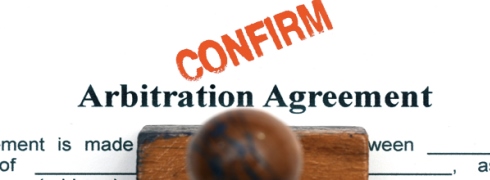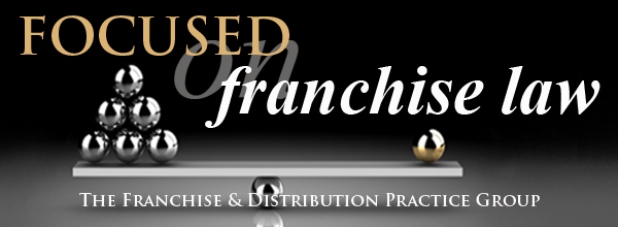Importance of Arbitration Clauses; and Reliance on Profit Projections

bkurtz@lewitthackman.com
dgurnick@lewitthackman.com
tgrinblat@lewitthackman.com
swolf@lewitthackman.com
msoroky@lewitthackman.com
kwallman@lewitthackman.com
tvernon@lewitthackman.com
February 2016
Barry Kurtz, David Gurnick & Tal Grinblat at IFA
Barry Kurtz, David Gurnick and Tal Grinblat attended the International Franchise Association’s Annual Convention in San Antonio this month. This is the 56th annual conference, which draws thousands of global business leaders, franchisors and suppliers.
Tal Grinblat Selected
For the third consecutive year, Tal Grinblat has been recognized as a U.S. Legal Eagle by Franchise Times Magazine. Legal Eagles are nominated by attorney clients and peers as the best in the industry.
FRANCHISOR 101:
The Importance of Arbitration Provisions

 Though some of the more important terms may appear early in a franchise agreement, some key terms placed near the end – the portion of the agreement that is often called “boilerplate” – may determine who wins or loses a legal fight. A franchisor that has a preference to arbitrate disputes should pay close attention to the arbitration provisions.
Though some of the more important terms may appear early in a franchise agreement, some key terms placed near the end – the portion of the agreement that is often called “boilerplate” – may determine who wins or loses a legal fight. A franchisor that has a preference to arbitrate disputes should pay close attention to the arbitration provisions.
Courts have held provisions requiring arbitration to be enforceable time and again. In Jacobson v. Snap-on Tools Co., a franchisee claimed that a provision in his franchise agreement compelling arbitration was unenforceable because the franchisee had not read it, saying it was “hidden”, and the franchisor had not called special attention to it. The court found the arbitration provision, which looked no different than the rest of the agreement, was not hidden and the franchisor had no duty to particularly point out that provision to the franchisee. The franchisor was able to compel arbitration.
But not all arbitration provisions are equal. In Meadows v. Dickey’s Barbecue Restaurants, Inc., two groups of plaintiffs sued their franchisor claiming fraud and franchise law violations. All the agreements signed by both groups had provisions requiring all “disputes” to be submitted to binding arbitration. Dickey’s moved to compel arbitration. The franchisees claimed they should not be bound by the arbitration provisions because, in their opinions, the agreements weren’t valid.
The court looked at the franchise agreements and found they were not all the same: for the first group, the definition of what had to be submitted to arbitration included disputes about validity of the agreement itself; but for the second group, “validity of the agreement” was not listed in the definition of “disputes.” As a result of the discrepancy, while Dickey’s had the right to compel arbitration with the first group, much more analysis and argument was needed to reach the same conclusion for the second group.
In summary: if you want arbitration, make sure you have an arbitration provision in your franchise agreement that is complete and well drafted.
Read the Motion to Dismiss or Compel Arbitration: Jacobson v. Snap-on Tools Company et al, or an Order Granting Defendant’s Motion to Compel Arbitration: Meadows et al v. Dickey’s Barbecue Restaurants Inc.
FRANCHISEE 101:
Relying on Franchisor’s Profit Projections

Most experienced franchisors know better than to make claims about profits franchisees can expect when those claims do not match the information in the franchisor’s Franchise Disclosure Document. However, if a franchisor or its representative does make a profit claim, can you rely on it?
In Fantastic Sams Salons Corp. v. PSTEVO, LLC, a franchisee claimed that, before he signed a Fantastic Sams Franchise Agreement, he was given promising financial documents in a private meeting with a company vice president and regional director. According to the franchisee, the documents showed that the salon would be profitable after just three months of operation. When the salon was not, in fact, profitable after three months, the franchisee sued Fantastic Sams for fraudulent misrepresentation.
However, as many franchisors do, Fantastic Sams required the franchisee to sign a disclaimer as a pre-condition to signing the franchise agreement. In that disclaimer was a statement that “NO ORAL, WRITTEN OR VISUAL CLAIM OR REPRESENTATION WHICH STATED OR SUGGESTED ANY SALES, INCOME, OR PROFIT LEVELS WAS MADE TO ME, EXCEPT:” Though several blank lines followed the statement, the franchisee wrote the word “None”. The court found this disclaimer defeated the franchisee’s claim of fraudulent misrepresentation, and dismissed his claim. Another court recently dismissed a franchisee’s fraud claim when the disclaimer was just a provision in the franchise agreement itself. Moxie Venture LLC et al v. UPS Store, Inc.
Had the Fantastic Sams franchisee described representations on the blank lines of the disclaimer, the franchisor may not have moved forward to sign a franchise agreement. For some franchisors, one purpose of the disclaimer is to screen out franchisees having potential to make the kinds of allegations described above. So what should a franchisee do if a franchisor makes profit claims, yet requires signing a disclaimer, or a franchise agreement with a disclaimer? In some systems, the answer is to choose between walking away from a deal that may involve misrepresentations, or going forward based on projections that are not supported, and without being able to rely on the representations provided.
Click to read: Fantastic Sams Salons Corp., v. Pstevo, LLC and Jeremy Baker or, Moxie Venture LLC v. The UPS Store, Inc.
